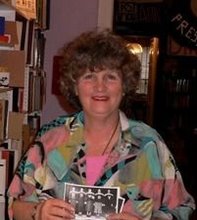
Under the gaze of the brave founders of the Bund, captured in charcoal drawings and turn of the century photographs, 60 or so contemporary Bund members living in Melbourne and their supporters gathered in the SKIF Center to honor Chaver Doctor Marek Edelman (1919-1009), the last surviving commander of the Warsaw Ghetto Uprising. This is the second Bund event I have attended here and once again I found the gathering touched by a sense of historical dignity, by a living dedication to the Bund vision of social justice, political freedoms and comradeship.
Under the red Bund banner, sat a portrait of Dr. Edelman and close by was a vase of yellow flowers, symbolizing the yellow tulips Dr Edelman placed for many years at the foot of the Polish monument to the uprising in the Warsaw Ghetto.
Under the red Bund banner, sat a portrait of Dr. Edelman and close by was a vase of yellow flowers, symbolizing the yellow tulips Dr Edelman placed for many years at the foot of the Polish monument to the uprising in the Warsaw Ghetto.
We watched news coverage of the funeral procession, thousands it seemed walking quietly down a broad Warsaw boulevard after his casket, Polish soldiers forming an honor guard. The ironies of history. Arnold Zable spoke about his meeting with Edelman last year, after a lifetime of admiration and how direct, clear- headed and pragmatic the freedom fighter was about the hard choices that they had to make in their armed struggle, but Zable emphasized, Edelman did not glorify the use of arms. “He told me,” Zable said, “that he admired those who decided to die with dignity in the camps as profoundly as he did those who died with guns in their hands. He detested the phrase, ‘they went to their deaths like lambs to slaughter.’”
A short except from a two hour filmed interview with Edelman about daily life and resistance in the ghetto highlighted the complexity of Edelman’s humanism. In stark black white, with deep shadows etched on his face, Edelman spoke of the day by day maneuvers, of the decisions of who would live that day and who would die. At times, we heard only his voice while we watched haggard people trying to find a place to hide. This man with an aching heart said if the choice was to save a 15 year old daughter or a 20 year old man, we had to choose the one who could best fight. Shadows and clarity, a terrible kind of clarity.
A three page English translation of a biography of Edelman was waiting on every seat so those of us who did not speak Yiddish could follow along as Bobbi Zylberman spoke in elegant Yiddish. One of the reasons I go to the Bund events is because of the opportunity to hear Yiddish in a living progressive political setting. Dr. Edelman who escaped the ghetto through the sewers of Warsaw chose to stay in Poland where he continued his lifelong support of liberation struggles including the struggle for a Palestinian homeland, a struggle though, he advised Palestinian leaders, that should not use civilians as military pawns. For his willingness to engage the Palestinians, Edelman has become a hero in exile in Israel.
Throughout the evening, people greeted each other, held each other and what impressed me greatly was the large number of teenagers present, all participating in some way in the night’s events. Unlike other Jewish progressive political gatherings I have attended, here there is a true intergenerationalism, meaning that there was another kind of energy in the room along with the historical sadness. Teenagers, speaking Yiddish, flirted and made sure the technology worked. They sang with hopeful voices the old songs.The evening closed with the wonderful singing of The Mir Kumen On Choir, featuring the strong young voices of three singers from SKIF. Once again the proud Bund anthems rang out and all around me, women and men late in their lives, stood as one and sang in Yiddish the Bund words of hope and resistance. In a small hall, with a gray carpet stained from much communal traffic, transpired something humanely wondrous, touched by shadows and song, by lives of courage and principle, by journeys of displacement and fraternity.

1 comment:
How important to always be gently reminded, with the tenderness of the heart, that people who survived prison camps, Holocaust, wars, are around us!
I met one Bosnian man selling sea shells on the island Brac on the Adriatique, in 2007. When I asked him where is he from, he looked and stumbled, because yes he is from a town which for him is now a reminder of the terror, Prijedor. He told me then slowly, how he still can't sleep, how his health is ruined from being held 4 months in the Bosnian-Serb army concentration camp - Trnopolje, in 1992.
Yes, dear Joan, never stop talking, it is so good you write for us
lepa mladjenovic, belgrado
Post a Comment